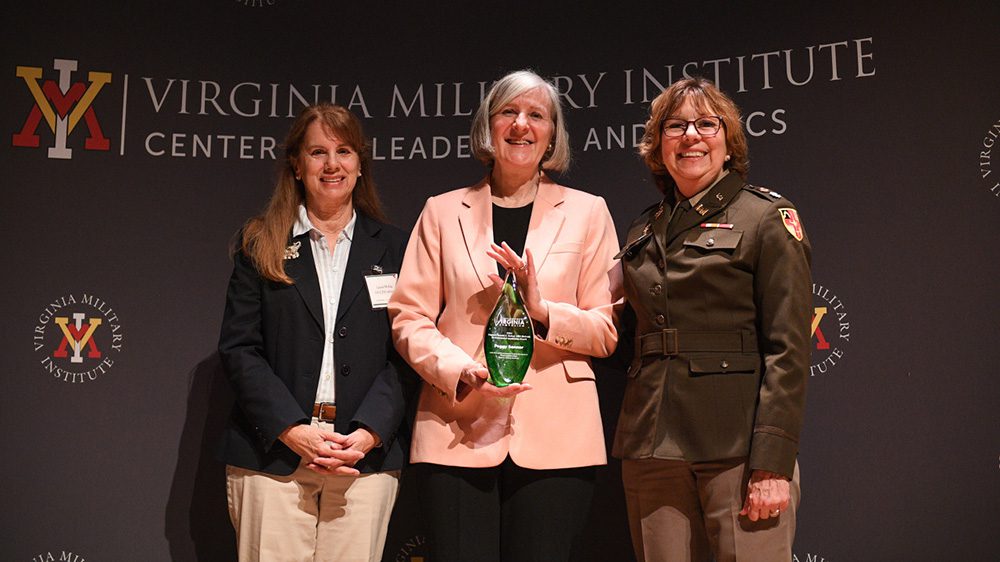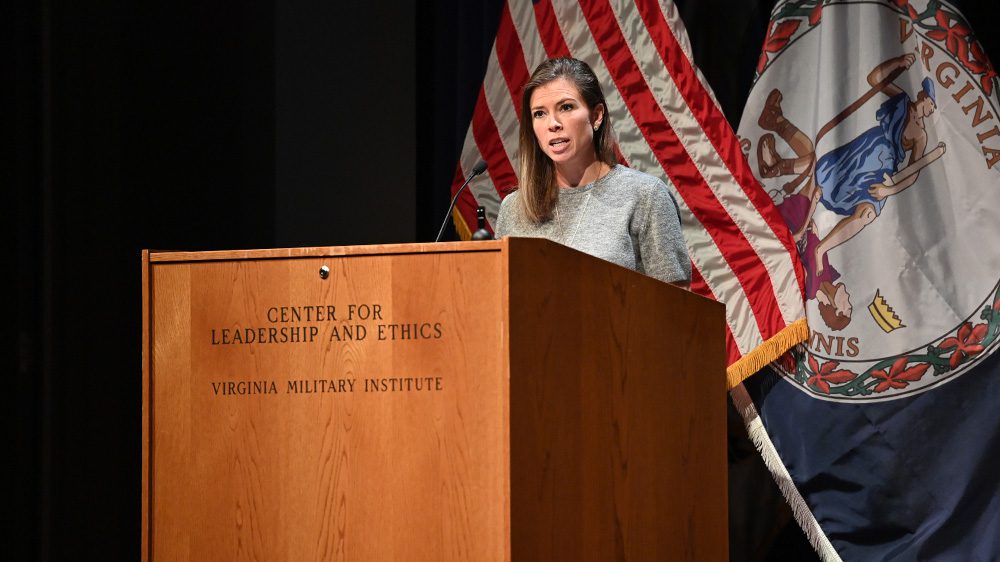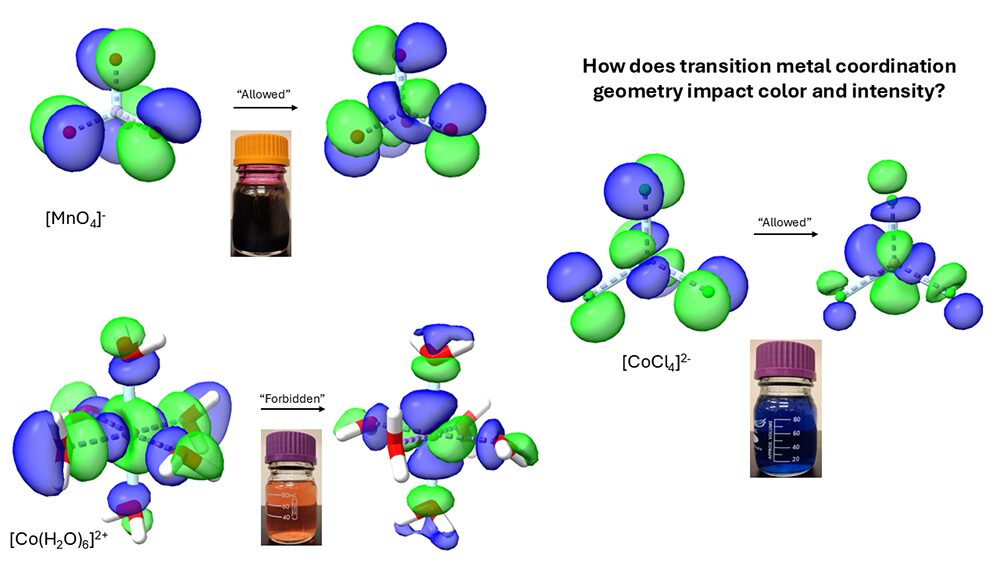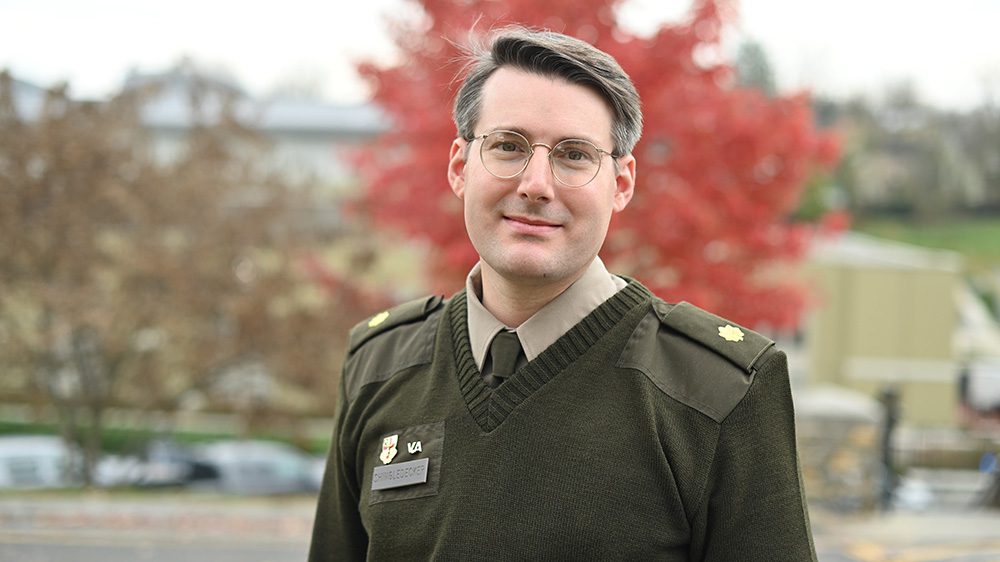The 34th annual Environment Virginia Symposium was held at VMI April 9–11, 2024. The event, organized and co-hosted by the VMI Center for Leadership and Ethics, attracted 550 attendees from state and local governments, nonprofit organizations, higher education, and the private sector. Col. Dave Gray, CLE director, served as master of ceremonies.
According to Justin Spears, CLE conference operations coordinator, a conference app was fully implemented this year to enhance attendees’ symposium experience. “I’m pleased that 320 attendees downloaded the app,” said Spears. “We tested it and used it partially last year, but this year, we are using it to its fullest capacity. We are able to communicate information on event scheduling, speakers, exhibitors, sponsors, and hotel shuttle information. We can even send out push notifications for announcements. It has been tremendously useful.”
Topics discussed at this year’s breakout sessions included wetlands, community flood preparedness, the benefits of oysters, safe wildlife corridors, climate resilience, solar power, septic solutions, urban and suburban landscaping, transportation planning, working with sovereign tribes and underserved communities, combating invasive fish and plants, the health of the Chesapeake Bay, and more.
The agency directors’ panel was moderated by Bettina Ring, Virginia director of The Nature Conservancy, and featured five state government officials from the conference’s co-hosting agencies: Matthew Wells, Department of Conservation and Recreation director; Mike Rolband, Department of Environmental Quality director; Ryan Brown, Department of Wildlife Resources executive director; Jamie Green, Virginia Marine Resources Commission commissioner; and Rob Farrell, Department of Forestry director.
Wells became DCR director in March 2022 and holds a degree in foreign affairs from the University of Virginia and a certificate in sustainability from Virginia Commonwealth University. He wants to expand access to outdoor recreation, open new parks, provide additional park amenities, and ensure the parks are safe and well-maintained.
Improving water quality in the Chesapeake Bay and mitigating high-risk dams are high-priority projects for his department. Wells is also striving to be as inclusive as possible to all groups of people. “We seek a diversity of opinions. We have recently hired a director of cultural resources, who has done a great job reaching out to the Tribal Nations,” he stated. He added that 60% of flood funds go to low-income areas and that the parks department has ongoing educational programs to teach families about nature and how to fully enjoy the outdoors.
Rolband, who joined the DEQ in January 2022, founded Wetland Studies and Solutions Inc. in 1991. The company assisted land developers and public works agencies in navigating the Clean Water Act, the Chesapeake Bay Preservation Act, and local environmental regulations. Rolband good-naturedly shared that most people do not like regulators, which is his primary job. “The DEQ regulates land, air, and water. I think it’s really fun and interesting. We have the cleanest air, the cleanest water, and the cleanest land that I have seen in my entire adult life. If you look at all the statistics, the reason our citizens can hunt and fish is because the regulatory programs have worked in Virginia. We have resources that are unsurpassed since the 1970s. Back then, if you swam in the Potomac River, there was a chance you would get seriously sick, but now the water is amazing. You can go fishing there and thoroughly enjoy it.” he said.
Brown, who is an avid hunter, angler, and outdoorsman, has overseen significant improvements in the DWR’s law enforcement division during his five-year tenure. He developed the commonwealth’s first modern elk hunt and has undertaken significant conservation initiatives. He serves on the executive committee of the Association of Fish and Wildlife Agencies and is vice president of the Southeastern Association of Fish and Wildlife Agencies. He holds a bachelor’s degree from the University of Virginia and a law degree from the University of Richmond School of Law. Brown stated that his department works hard to engage all groups of people. “One simple rule is to be intentional. We reach out to people where they are and strive to build relationships,” he stated.
Farrell serves as the eighth state forester of Virginia, as well as the director of the DoF, which is responsible for protecting Virginia’s forest resources. Farrell echoed his favorite mantra from previous years’ conferences, “Trees are the answer. Whatever the problem is, trees are the solution.” He emphasized the importance of planting trees and building community support and understanding of trees and their many benefits.
“Our urban community folks are really focused on building the community infrastructure,” he said. “The worst thing we can do is come into a community and say, ‘Hi, we’re from the government. Here’s your tree. Good luck.’ We have to help communities understand how trees and nature can help them. Increasing the urban tree canopy is good for people’s health and the economy.”
Green, who was appointed to his current position in 2022, started his career at the VMRC in 2005 as a law enforcement officer. Notably, he played a pivotal role in acquiring and managing several federal grants and oversaw the Joint Enforcement Agreement with the National Marine Fisheries Service, a division of the National Oceanic and Atmospheric Administration. He actively participates in various marine conservation and maritime committees.
Green quipped that he loves oysters even more than Farrell loves trees and reported on the success of the oyster industry. “Forty years ago, oysters were on the brink of extinction because of parasites. Now, the population is extremely healthy. Building oyster reef habitats improves water quality and is the equivalent of planting trees for air quality. Oyster reefs attract more wading birds, more fish, shrimp, and seahorses. It is a huge economic benefit for recreational fishing.” he said.
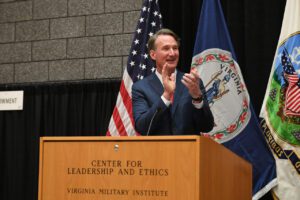
During his keynote speech, Virginia Gov. Glenn Youngkin thanks conference participants for their commitment to protecting Virginia’s natural heritage.—VMI Photo by H. Lockwood McLaughlin.
In his keynote speech Wednesday evening, Virginia Gov. Glenn Youngkin reflected on the natural heritage, natural wonders, and many blessings in the Commonwealth of Virginia that should be preserved and treasured. “It is, in fact, a responsibility that falls to all of us, from the deepest valleys to the heights of our tallest mountains, across our coastal plains, and through our wild lands. We collectively must work together to steward, preserve, and protect our most precious resources and ensure that those blessings are there for future generations,” he declared. Youngkin was also honored during the parade held Wednesday afternoon, during which he took review with Maj. Gen. Cedric T. Wins ’85, superintendent.
Youngkin went on to say that the balance between economic development and preserving nature is not an either/or situation but rather a both/and moment. “We can use our natural resources to further benefit Virginia economically, all while doing so transparently.” He spoke about all that his administration has achieved over the last two years. “From the coast to the mountains, we have awarded nearly $120 million in funding to help communities address flood resiliency through the Community Flood Preparedness Fund. We also launched the Resilient Virginia Revolving Fund to help provide nonfederal matching for federal resilient grants. It’s amazing what we can achieve when we work together and take ideas and turn them into actions.”
The governor reported multiple achievements among state agencies. The DEQ has improved agency permitting process time by 40%, and the DWR has made the outdoors more accessible by opening more than 30,000 acres of public and private lands for outdoor recreation and was named State Fish and Wildlife Agency of the Year by the Congressional Sportsman Foundation.
In addition, Youngkin noted that $2.4 million was spent to support tree-planting efforts across the commonwealth. Furthermore, civic communities, local governments, tribal organizations, nonprofit organizations, neighborhood associations, public educational institutions, state agencies, and volunteer groups were all engaged in over 100 projects. He stated that the Chesapeake Bay holds a very important part of his attention and continues to be a priority.
He concluded by expressing his appreciation to those assembled. “I can go on and on about the incredible progress that has been in motion over the past year, as I just barely touched the surface. Clearly, there is a lot ahead of us. If I could express one simple sentiment to all of you tonight, it is thank you for your commitment, your passion, and your love of this work, for protecting Virginia so that future generations might come to enjoy it and for instilling in them the importance of stewardship of our blessings, and to pass them on to the next generations.”
The closing plenary speaker of the conference was Adam Ortiz, regional administrator for the Environmental Protection Agency mid-Atlantic region. Prior to working at the EPA, Ortiz was director of the Montgomery County, Maryland, Department of Environmental Protection, where he launched programs boosting recycling, curbside compost collection, building energy efficiency standards, and ecological targeting to watershed restoration projects. As mayor of Edmondston, Maryland, for three terms, Ortiz spearheaded the state’s first complete “Green Street” that captures and filters stormwater runoff and prevents chronic flooding.
A unique part of the annual symposium is the announcement of the winner of the Erchul Environmental Leadership Award, named for the late Capt. Ronald A. Erchul, Ph.D., former professor of civil engineering at VMI and founder of the Environment Virginia Symposium. This award recognizes a Virginian who has made significant individual efforts to improve the environment. This year, Margaret L. “Peggy” Sanner, Chesapeake Bay Foundation Virginia executive director, received the award.
Sanner retired last August after a successful career with the CBF focused on environmental law and policy. She played a pivotal role in advancing legislative and regulatory environmental policies, including fencing cattle out of streams, banning phosphorus from lawn fertilizer, establishing a comprehensive nutrient trading program, and expanding tree cover. She has also been a leading advocate in the development and maturation of Virginia’s clean water regulatory programs, including improving and protecting wetland preservation and mitigation policies, advocating for effective implementation and enforcement of the Chesapeake Bay Preservation Act, and ensuring that stormwater, erosion, and sediment control programs are backed by science.
Sanner has led collaborative efforts to ensure historic levels of funding for state clean-water programs to reduce pollution from wastewater, stormwater, and agriculture. She was an active member of the Virginiaforever Collaborative, providing leadership for increasing state funding for land conservation and water quality improvement. In addition, Sanner mentored numerous law students and interns, providing them with solid experience that led them to successful careers. She has made an indelible mark on the conservation of Virginia’s waterways, in shaping environmental laws, regulations, and policies, and in building solid partnerships.
Each year, VMI donates $1,500 to a nonprofit environmental organization of the recipient’s choice in their honor. Sanner has requested this donation be made to the Virginia office of the Chesapeake Bay Foundation.
Next year’s Environment Virginia Symposium is scheduled for April 8–10, 2025, at VMI.
